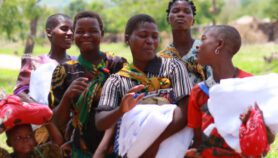15/04/24
African-led clinical research needs pharma buy-in

By: Caxton Murira
Send to a friend
The details you provide on this page will not be used to send unsolicited email, and will not be sold to a 3rd party. See privacy policy.
Africa-led medical research is essential to tackling the continent’s healthcare challenges, writes Caxton Murira of the Science for Africa Foundation.
[NAIROBI] Africa is experiencing unprecedented growth in terms of both population and economic transformation.
As witnessed during the pandemic, there is an increasing critical mass of expertise and ability for health innovation contributing to the global health agenda.
These factors, and the rising burden of both neglected tropical diseases and noncommunicable diseases, present an opportunity to strengthen and expand clinical research and trials throughout Africa.
“Pharma must prioritise uninterrupted healthcare access by investing in sustainable local capacity, collaboration, and alignment with Africa’s public health needs.”
Caxton Murira, Science for Africa Foundation.
According to Clinicaltrials.gov, Africa accounts for around 4 per cent of global clinical studies. Although reports are sometimes classified as “African” in scope, randomised clinical trials are rarely continent-wide, and many nations are not represented in even one study.
Drug discovery is also inconsistently matched with public health needs, which limits African-led health innovation.
If vaccines, drugs, and medical devices are to work better, they need to be tested on groups of people who have the same epidemiological and demographic traits as the people who will be receiving the treatment.
In recent years, Africa has increased its efforts to be conducive for vaccine development. However, more work is needed to increase Africa’s part of vaccine development from its present worldwide proportion of 0.1 per cent.
The inequity can be attributed to several interrelated challenges. They include unpredictable regulatory environments, duplication of efforts because of poor stakeholder coordination, and ecosystem challenges like limited infrastructure, unharmonized regulations, poor market access, a limited policy landscape, insufficient funding.
The Pan African Clinical Trials Registry and the Clinical Trials Community have extensively documented these characteristics.
Why capacity development is critical
Africa-led health research and sustained capacity building in clinical research and trials are essential to tackling Africa’s specific healthcare challenges.
Building a critical mass of expertise through training, infrastructure development, access to technological, and long-term funding, are key components for increasing participation in clinical research and trials. This contributes significantly to the discovery and development of effective and customised vaccines, diagnostics, and therapeutics.
Existing strengths and capacities should be leveraged through equitable partnerships to ensure adequate resource allocation and utilisation for positive impact.
COVID-19 underscored the need for a continent-wide, multisectoral, multi-stakeholder approach to achieve desired results. This served as a long-term example of how to cooperate during emergencies. Many lives were saved through initiatives that utilised industry cooperation as part of a coordinated response.
Among Africa’s multisectoral initiatives is the Partnerships for African Vaccine Manufacturing (PAVM) initiative, which collaborates with pharmaceutical companies to advance vaccine development and manufacturing through technology transfer, intellectual property support, trade, and policy advocacy.
There is also The H3D Foundation, which partnered with the International Federation of Pharmaceutical Manufacturers & Associations (IFPMA) to advance drug research and development in Africa, as well as the African Pharmaceutical Technology Foundation, which strengthens bilateral initiatives to manufacture pharmaceuticals locally, including a partnership between BioNTech and Senegal’s Pasteur Institute to produce COVID-19 vaccines.
The role of pharmaceuticals
The pharmaceutical industry has learned that considerable progress requires increasing collaboration and the establishment of well-defined priorities in Africa and other underrepresented regions.
The pharmaceutical business models revolve around the creation of profitable new drugs to prevent and treat existing and emerging diseases to boost company value. This may not always align with patients’ desire to receive uninterrupted and affordable access to healthcare.
Africa as a continent remains an important market for medicines and medical equipment from major pharmaceutical companies and device manufacturers in the higher income countries. Businesses are starting to facilitate the transfer of funds, knowledge, and technology to establish long-term local capability.
Africa’s pharmaceutical sector has more than tripled, from US$19 billion in 2012 to $66 billion by 2022, making it the world’s fastest-growing market, according to a UN report. With projected growth in the industry, there is the opportunity to create millions of employment and improve the lives of African residents and their families.
Institutions such as the Africa Centres for Disease Control and the African Medicines Agency have been mandated to coordinate with industry players to create an equitable framework to drive the delivery of new products for the African patient. This will require strong commitment from key stakeholders, regulatory oversight, and stakeholder cooperation. It will also require a strong coordination framework.
The Science for Africa Foundation recently announced a new project through its Clinical Research and Trials Community programme. The initiative will promote collaboration for clinical research capacity in Africa. It also encourages active industry participation through initiatives such as the Clinical Trials Community Africa Network to enable visibility of clinical trial capacity in Africa and access to clinical trial networks and epidemiological data.
The growth of the pharmaceutical industry in Africa has shown pharma’s ability to drive innovation and global health through collaboration. Pharma must prioritise uninterrupted healthcare access by investing in sustainable local capacity, collaboration, and alignment with Africa’s public health needs.
Caxton Murira is the lead for the Clinical Research and Trials Community Programme at the Science for Africa Foundation, a pan-African, non-profit and public charity organisation created to support, strengthen and promote science and innovation in Africa.
This piece was produced by SciDev.Net’s Sub-Saharan Africa English desk.













